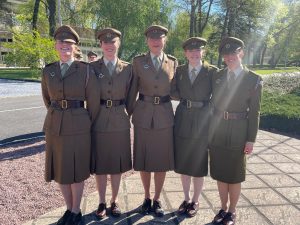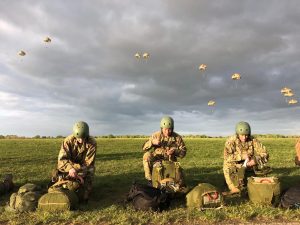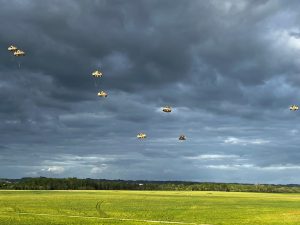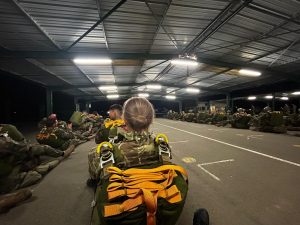Introduction: The focus of the exercise was for five members of the First Aid Nursing Yeomanry (FANY) to attend and complete the rigorous static-line parachuting training course at the Centre École des Troupes Aéroportées (ETAP) and thereby earn their ‘French Wings’. Over two weeks, participants underwent intensive physical and theoretical training alongside 125 troops from the French military on the standard paratrooper course.
The five FANYs organised and delivered their own physical training plans, arranged travel, transportation, medical tests, kit and administrated their own exercise with assistance from the Corps.
The FANY have a strong historical link to France by virtue of the service of 39 women from the Corps who aided the French resistance during the Nazi occupation of France in World War II. Nearly all these personal deployed to France at night and in secret, via parachute. Of these individuals, 13 lost their lives at the hands of the Gestapo before the war was over. This year, 2024, marks the 120th anniversary of the Entente Cordiale between France and the UK and the dates of the exercise (March 31st – to April 15th) coincided with the signing of the treaty on April 8th, 1904. Both nations put a special emphasis on the presence of British personnel at ETAP at this time. To mark this extra special occasion, the FANY Commanding officer and a delegation from the Corps came out to Pau in time for the planned wings ceremony at the end of week two.
Preparation: Preparation for this demanding exercise spanned more than a year, involving meticulous planning and rigorous physical and technical training before a final five were selected from an initial 14. Notably, candidates underwent a civilian static line course in the UK, serving as a prerequisite for the final selection of the expedition’s five participants. Together the squad dedicated hundreds of hours to training – running in all weathers and experiencing a few unexpected events – a small wrist fracture after a fall during a run, being diagnosed with asthma, and an engagement!
Course Structure: The two-week course was divided into physical tests, theory, and practical components. The first week focused on fitness and lectures providing participants with essential knowledge and skills required for parachute operations, including what to do in the event of malfunctions (parachutes not opening, being blown into a tree and what happens if you stay attached to the aircraft after jumping out…!).
Day one and the stringent fitness tests started, taking up two days and requiring participants to demonstrate their physical suitability for the course ahead. This included running 1.5km followed by an 8km run in battle dress while carrying a 5kg weight. Strength tests comprised squats, press-ups, sit-ups, and, in total, an 8-meter rope climbing exercise, ensuring participants were primed for the challenges ahead. However, the toughest part was the overarm bar hold – 15 seconds with your chin over the bar – like a chin-up that never ends! It took months to build the grip strength and the grit to nail this.
As a squad we’d decided not to actively run together in the test but instead to never let the last FANY run alone – in the end, our strongest runner ran with our slowest who ended up with a personal best! The supportive relationship between the French and the FANYs was evident at this early stage with finishers encouraging comrades as they too crossed the line.
Failure at any of these stages would mean not only going home without their ‘wings’ but leaving the course with immediate effect. This really hit home at the end of week one:
All participants had to jump from a 20m tower and perform a roulé-boulé, the term for a parachute landing where one lands on one hip and then seamlessly and simultaneously rolls on to the opposite shoulder and flips one’s legs over. Wearing a parachute harness and attached to what’s best described as a near-vertical zip line, our rate of decent was kept to around 6 meters per second (which feels very fast) and all the course participants and instructors were looking on under the hot Easter sun. After scrabbling up from your landing, you had to present yourself to the chief instructor, give your name and rank and receive his feedback. If there is room for improvement, then you had to climb up and go again, but you only get three chances. Four people, including a senior officer were sent home that afternoon.
Staying calm under pressure and resilient in the face of these challenges and potential dangers was tough. Afterall, anyone of us could get injured, even in training, let alone when jumping for real. To combat that we built hot-debriefs into our days and, as IC (person in charge) I caught up with each squad member to chat through their day. Managing these stresses and having some down time, were crucial to success. After all, we are civilians and aren’t used to sharing a dormitory, eating, and working with the same people for days on end. To decompress, squad members went for runs and walks, did laundry (oddly popular!) or, in my case, spent a long time in the gym on a rowing machine, to get some me-time.
Week two transitioned into practical application, where participants underwent actual jumps. It was almost a relief to have got the training over!
Weather Challenges: The commencement of the practical phase was contingent upon favourable weather conditions, particularly wind speeds of under 3 knots. However, despite blue skies and the snowy Pyrenees dazzling to the south, it was too windy for our first jump. This necessitated patience, and a lot of it. You really can only sit (or walk, or read, or play Bananagrams, or go to the gym) and wait it out.
However, what really happened was we bonded with each other and built friendships with those around us. We explained what the FANY does (including that we are unpaid volunteers – incredulous shock from our French friends) and what the FANY did in World War I and II (more shock and a great deal of respect for the efforts and bravery of women such as Nancy Wake and Noor Inayat Khan). For a week we rose before sunrise and ate and slept when we could to be ready to jump when the call came.
Jumping Exercises: To earn their ‘Wings’, course participants were required to execute six jumps, each escalating in complexity and payload. The first two jumps involved jumping from 400m on your main parachute whilst being ready to deploy the reserve chute, should a major malfunction occur.
Subsequent jumps incorporated simultaneous deployments from both sides of the aircraft at one-second intervals, with additional day sacks and equipment, increasing the payload to approximately 25kg. The final jumps challenged participants to leap from just 300m with bergens loaded with weighted metal containers, both in daylight and night conditions, amounting to a total payload of 35-40kg.
During all these the words of Clem, our course liaison and interpreter, rang in our ears, “the ground is always coming to meet you!”
Language and Cultural Immersion: A unique aspect of the training was its delivery entirely in French, facilitating linguistic and cultural immersion for us all. This experience really made one concentrate on the demonstrations and fostered cross-cultural understanding and camaraderie with our French counterparts. We had a fantastic translator, but no quarter was given and briefs in English were short and ran concurrently with instruction to the French troops.
Conclusion: The expedition to Pau and our time at ETAP proved to be hugely challenging yet rewarding endeavour for all five of us. Through unwavering determination, physical resilience, and effective collaboration with French military personnel, we successfully completed the two-week static line paratrooper course, earning our coveted ‘French Wings’ which we are permitted to wear on our FANY uniforms – a huge honour.
Each FANY had their own reasons for taking this challenge on and, on being awarded her wings, had her own reflections. Perhaps echoes from our wartime FANY sisters had rung in her ears as she jumped into the star-lit midnight skies; or perhaps the trial of getting to paratrooper-level physical shape was her goal; representing the Corps and our country overseas was another achievement that stood out. For one FANY, the daughter of a serving FANY (who herself is a qualified skydiver and part of the CO’s delegation to Pau) I know it meant the world to her. For me, as IC, my sense of accomplishment was strongest felt in steering ‘my squad’ through a year of training and getting all five to the medal ceremony. The gratitude and support of the squad to me personally was immensely moving and I am so proud of all of our efforts.
In short, whatever our personal motivations, the exercise exemplified the spirit of international cooperation and adventure. As the FANY motto says Arduis Invicta – in difficulties unconquered!
We are extremely grateful to the Ulysses Trust for their very generous grant towards the costs of this expedition and the Corps hopes to return to ETAP in 2026.




